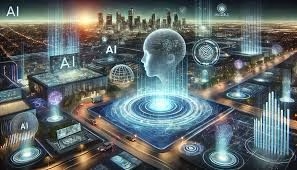Agentic AI – The Future of Autonomous Systems That Act Proactively
Artificial Intelligence has traditionally been seen as a tool that responds to human commands—from answering queries on chatbots to automating business workflows. However, a new paradigm is rapidly emerging: Agentic AI. Unlike conventional AI, which is reactive in nature, Agentic AI represents a revolutionary shift where machines can act proactively, set their own goals, make decisions, and adapt dynamically without constant human intervention.
In this blog, we’ll explore what Agentic AI is, how it works, key applications, benefits, challenges, and its future impact across industries.
What is Agentic AI?
Agentic AI refers to artificial intelligence systems that go beyond simply performing pre-programmed tasks. Instead, they operate as autonomous agents capable of reasoning, planning, and acting within an environment to achieve objectives.
Key features include:
- Proactivity: AI doesn’t wait for instructions; it anticipates needs and acts.
- Goal-Driven Behavior: It defines and prioritizes tasks to achieve set goals.
- Adaptability: Learns from feedback and changing conditions in real time.
- Decision-Making Autonomy: Chooses the best course of action without human approval.
This is a major step forward from Generative AI (like ChatGPT or image creators) which generates outputs but does not independently act on them.
How Agentic AI Works
Agentic AI integrates multiple technologies and approaches:
- Cognitive Architectures – Frameworks like ACT-R and SOAR mimic human decision-making processes.
- Reinforcement Learning – The system learns optimal actions by receiving feedback (rewards or penalties).
- Planning Algorithms – AI creates multi-step strategies to reach objectives.
- Natural Language Understanding (NLU) – Enables interaction with humans in natural ways.
- Integration with IoT & Robotics – Allows AI agents to act physically in the real world.
For example, an agentic customer service AI could monitor user behavior, anticipate issues, and reach out with solutions before the customer even asks.
Applications of Agentic AI
Agentic AI is poised to transform multiple industries. Some use cases include:
1. Healthcare
- AI medical agents monitoring patients remotely.
- Proactively suggesting treatments, scheduling checkups, or alerting doctors.
2. Business & Customer Experience
- AI sales assistants initiating personalized offers.
- Automated supply chain agents optimizing logistics without manual oversight.
3. Finance
- Proactive fraud detection systems halting suspicious transactions instantly.
- Investment advisors adjusting portfolios dynamically based on market shifts.
4. Smart Cities
- Traffic control systems making autonomous real-time adjustments.
- Energy grids optimizing power distribution.
5. Personal Productivity
- Digital assistants booking appointments, replying to emails, or even negotiating service costs without prompts.
Benefits of Agentic AI
- Efficiency: Reduces the need for constant human supervision.
- Speed: Acts in real time, faster than human intervention.
- Scalability: Manages multiple tasks simultaneously.
- Personalization: Learns user behavior to provide highly tailored services.
- Cost Savings: Automates complex decision-making processes.
Challenges and Ethical Concerns
Despite its promise, Agentic AI raises critical questions:
- Control & Safety: How do we ensure AI actions align with human values?
- Transparency: Decisions must be explainable to avoid black-box risks.
- Bias & Fairness: Proactive decisions should not reinforce harmful biases.
- Security Risks: Autonomous systems may become targets for cyberattacks.
- Accountability: Who is responsible if an autonomous AI makes a harmful decision?
Regulatory bodies worldwide are beginning to address these concerns through AI governance frameworks and safety standards.
The Future of Agentic AI
The rise of Agentic AI represents a paradigm shift in artificial intelligence. Instead of just being reactive tools, AI agents will function as partners—anticipating human needs, solving problems proactively, and even collaborating with other AI agents to achieve complex goals.
In the near future, we may see:
- Autonomous AI agents managing entire business departments.
- Healthcare agents offering early disease diagnosis.
- Smart homes where AI anticipates needs seamlessly.
- AI systems negotiating deals, contracts, and even policies.
The transition from Generative AI to Agentic AI could be as transformative as the jump from the internet to smartphones.
Conclusion
Agentic AI marks the beginning of autonomous, proactive intelligence in machines. Its ability to act independently, set goals, and adapt to changing environments will redefine industries, economies, and daily life. While challenges of safety, ethics, and governance remain, its potential benefits far outweigh the risks if implemented responsibly.
As technology evolves, businesses, governments, and individuals must prepare for this next wave of AI innovation—where machines not only assist but actively collaborate to shape the future.





